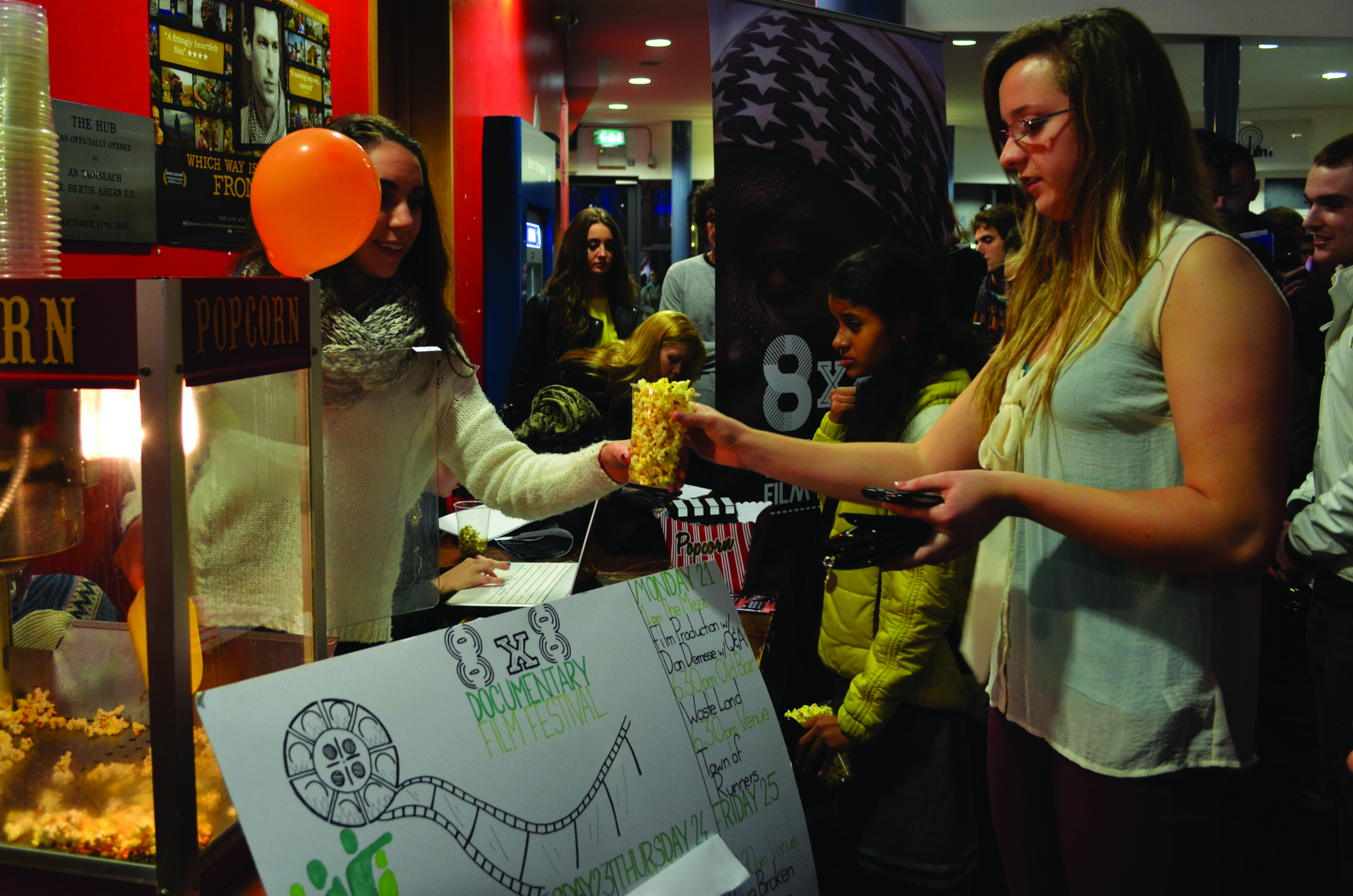
One week, countless films and over 400 attendees. The SUAS 8×8 film festival toured five campuses around Ireland, including TCD, UCD, NUIG and UCC, with their week in DCU attracting the second highest turnout.
So what did DCU make of the festival’s documentaries?
“Well I think overall the reaction to the festival was a positive one”, said Claire Peterson, one of the main organisers of the film festival at DCU. “Living on One Dollar in particular had a massive turn out. After that film, loads of people said that they felt so guilty munching on their popcorn while watching people live on a dollar a day. One thing that a few people said was, ‘what was the point of showing these inspiring documentaries when they felt they could do nothing about it?’ To these comments we showed them the Suas prospectus and Stand.ie, two outlets for anyone enraged by what they saw.”
Fire in the Blood was a documentary about the epidemic of HIV and Aids in Africa over the years, and how the US controlled the African drug market by not allowing generic drugs to be produced and insisting only their expensive ones be sold. Most people in Africa could not afford the expensive American drugs, causing around 10 million preventable deaths. The documentary opened with the statement, “If it’s true that one death is a tragedy and one million deaths is a statistic, then this film is a statistic.”
The documentary was followed by a panel discussion chaired by Dil Wickremasinghe from Newstalk. The panel consisted of Dr. David Weakliam, the Programme Lead for the Global Health Programme at the HSE, Dr. Anne Matthews from the DCU School of Nursing, Dr. Michael Breen from the DCU School of Law and Government, and Conall O Caoimh, the Director and Founder of Value Added in Africa.
Weakliam said he had mixed feelings about the documentary. “It was inspiring…showing that progress can be made”. However, he added “I think its portrayal of how we deliver drugs to markets was biased….the only way we have to do this is through capitalism.” Breen suggested that students wanting to help the situation could sign up for free to the Irish forum of global health, O Caoimh suggested that students take simple measures such as tweeting and blogging about the issue.
According to Ciaran O’Connor, SU Education Officer, “It’s very easy to watch this documentary and get riled up with these big pharmaceutical companies. Fair enough, to the average person their morals are questionable, but at the end of the day they’re there to make a profit. Although, when moral obligations are about something as sensitive as the issue of HIV and Aids, I think the question has to be asked if this is OK? As far as I know, there’s been an agreement made this year that has kind of reversed some of the complications, but that wasn’t seen because the DVD finished early. I think we’re doing as much as we can but there’s more work that can always be done. In terms of the documentary, it was an eye opener.”
Which Way is the Front Line from Here? The Life and Time of Tim Hetherington was a biopic tale of the life and work of the conflict zone photojournalist Tim Hetherington. His work was dangerous, but Hertherington had always wanted to return to the conflict zones. He was shown to be a kind person, who loved people and wanted to get to know human nature first and foremost. He was never interested in picking sides with his war photojournalism. Hertherington was unfortunately killed by mortar fire in Libya in 2011.
Paul Gallagher, a first year Multimedia student with a keen interest in photojournalism, attended some of the screenings. “I actually really enjoyed it. I’ve seen a lot of films in Hollywood, like “Platoon”, and although they seem realistic, it’s very different to actually seeing a documentary where someone was actually there. To see all the subtleties, like the men slowly getting exhausted, and the fear on their faces, and to actually show the dead bodies, it’s very different to when you’re watching a Hollywood movie where it’s all acting and make up.”
Mary McDonnell, a final year Journalism student, also watched the documentary. “I thought it was a brilliant piece of work. Not only was it sad and beautiful as all stories of war and death are, it also made me question my own motives and why I decided to study journalism in the first place. Tim Hetherington was never in it for the byline or to satisfy his ego. He was just fascinated by people and the film showed his warmth and his compassion. His colleague says Tim blurred the lines between humanitarianism and journalism. He didn’t want a front page splash, he just wanted to know more about human nature and share what he learned with the world.”
The festival seems to have been a huge hit with DCU students, with O’Connor saying “It has really engaged students in issues that they wouldn’t face on a day to day basis. You just need a few people who might feel a bit more social responsibility because of it. I think Suas deserve a lot of recognition and applause for this.”
David Nevin, the project manager for the Global Campus Programme at Suas, explains that the reaction was so positive to the film festival, extra screenings have been added. “We’re currently in contact with the DCU School of Law and Government for a follow up screening night of the most popular films.” It is hoped these screenings will take place in the next month or two.
Suzanne Cooper
Image credit: Marie Lecoq

Leave a Reply